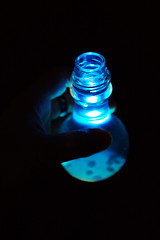The Magic Potion Of SEO
magic-noun
1. the art of producing illusions as entertainment by the use of sleight of hand, deceptive devices, etc. legerdemain, conjuring-to pull a rabbit out of a hat by magic.
2. the art of producing a desired effect or result through the use of incantation or various other techniques that presumably assure human control of supernatural agencies or the forces of nature.
If you have been scouring the net looking for that out of the box system, or automated piece of software which will help you to rake in those online pounds and dollars then you have no doubt been looking for a little bit of magic.
The more experienced of us realise that like the golden fleece-there is no magic potion for SEO. Fortunately what we do have is a number of tried and tested solutions you can apply to your business model in order drive the traffic and convert the visitors you need to realise you online goals.
We define the top 10 solutions:
1. Search Engine Optimisation – The term used to describe the marketing technique of preparing a website to enhance its chances of being ranked in the top results of a search engine once a relevant search is undertaken. A number of factors are important when optimising a website, including the content and structure of the websites copy and page layout, the HTML meta-tags and the submission process.
2. Pay Per Click – Advertising model in which advertisers pay for click-throughs to their website. Ads are served based on keywords or themes.
3. Blogging – is the act of writing in ones blog. To blog something is to write about something in one’s blog. This usually involves linking to something the author finds interesting on the internet.
4. RSS – is a format for delivering regularly changing web content. Many news-related sites, weblogs and other online publishers syndicate their content as an RSS Feed to whoever wants it.
5. Website copywriting – is the art of writing sales and marketing related materials. Copywriting is used in every major area of business such as Sales Letters, Business plans, advertising etc.
6. Affiliate Marketing – is a system of revenue sharing between one site (the affiliate merchant) which features an ad or content designed to drive traffic to another site (the advertiser). The affiliate will receive a fee based on the amount of traffic generated.
7. Web 2.0 – is a term often applied to a perceived ongoing transition of the World Wide Web from a collection of websites to a full-fledged computing platform serving web applications to end users. Ultimately Web 2.0 services are expected to replace desktop computing applications for many purposes.
8. Usability – efficiency with which a user can perform required tasks with a product, for example, a website. Usability can be measured objectively via performance errors and productivity, and subjectively via user preferences and interface characteristics. Web design features that affect usability include navigation design and content layout.
9. Site architecture- The structure of a web site. It reflects how information is organized, including categories, subsites, labeling and other relationships.
10. Links – The process of exchanging links with other websites is called Reciprocal Linking. Since both participating websites get an inbound link, it helps in building link popularity.
Julian Hall of
http://www.ehlonline.co.uk – SEO UK
– EHLOnline -
UK SEO, Search Engine Marketing (SEM), Pay
Per Click (PPC), Search Engine Optimisation (SEO)
Article from articlesbase.com
Related Magic Potions Articles
